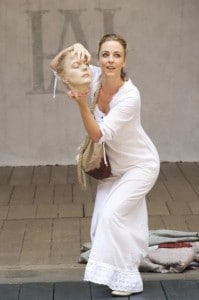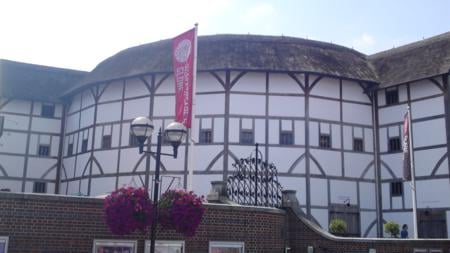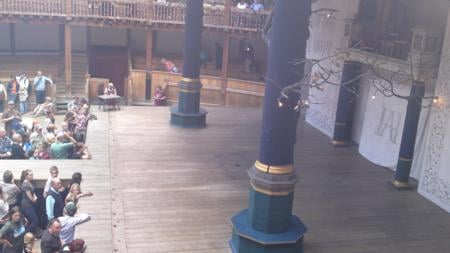 The following review of Howard Brenton’s play “Anne Boleyn”, which was performed recently at Shakespeare’s Globe in London is written by Anne Boleyn Files visitor, Laura Pearson – Thanks so much, Laura!
The following review of Howard Brenton’s play “Anne Boleyn”, which was performed recently at Shakespeare’s Globe in London is written by Anne Boleyn Files visitor, Laura Pearson – Thanks so much, Laura!
Anne Boleyn at Shakespeare’s Globe
“It’s my Bible! Why? Don’t you realise? This killed me! This book!”
Howard Brenton’s Anne Boleyn, directed by John Dove, opens with an effervescent, vivacious Anne Boleyn. On entering the stage, with a blooded bag on her shoulder, Anne proceeds to tease the audience whether to show its contents. Eventually Anne does and pulls out a small book, much to the dismay of the crowd. The book is William Tyndale’s translation of the Bible, from Latin, into English, highlighting Anne’s philosophy that the Bible should belong to everyone. An ideal also shared by James I which Brenton uses as the connection throughout his play.
Anne continues to parade on stage voicing her notions of the Tyndale book then suddenly recognising the true intrigue of the crowd, she pulls out her severed head. The audience are immediately reminded of the outcome to this woman’s life.
Brenton’s opening, is a captivatingly alternative introduction to the story of Anne Boleyn, introducing the audience to a re-materialisation of Anne Boleyn immediately portrays an Anne we have, until now, never seen nor, a voice we have ever heard. At once the audience is entranced.
Brenton, not unlike historians, explores possibilities of Anne Boleyn’s downfall, a curiosity which has held many in deep discussion and contemplation. However, rather than speculation and theory, Brenton speaks his belief via James I, bringing action as well as words to his approach. A unique and gratifying technique.
Rather than tell the story during Anne’s era we are plunged into the reign of James I, and after clambering into a chest which was brought to him for amusement, he discovers two books. It soon becomes apparent that these books were hidden for a reason as one is the a translation of the New Testament by William Tyndale, and the other The Obedience of a Christian Man, also by Tyndale, which contains writing on the edges in the hand of Anne Boleyn. This then sets the scene for the rest of the play. By focusing attention to the books during the opening and within the next scene, Brenton is not only drawing connections in the play but is also identifying plausible reasons for Anne’s execution, rather than worrying about hearsay accusations.

In his writing, Brenton cleverly entwines two stories which seem so obviously associated but have never really been explored together in such a dynamic and engaging manner; the story of Anne Boleyn and her passion for a reformed church and the beginnings of the legacy of what became the the James I Bible.
James’s intention on finding out what happened to Anne and why she was executed runs as a subplot throughout, a tool Brenton uses to guide his audience to his Anne Boleyn. During the play James becomes haunted by Anne, at the very end, working out the reason for her fall.
JAMES. It was the money, wasn’t it. That’s why you fell.
ANNE. Men and the money.
JAMES. I looked at the records of the dissolution of the
monasteries I saw how Cromwell filched thousands. I
have an eye for accounts.
ANNE. The money was meant for schools, universities, houses
for the relief of the poor. Cromwell stole it.
Here we see Anne as Brenton wants us to see her; a woman who was dedicated not only in reforming the church, but refining education and revising relief for the poor. A woman who spoke a philosophy before her time, who had played the game among the men but was, tragically, not as quick witted to the likes of Cromwell. What is most refreshing is how Anne is not represented negatively. Brenton’s portrayal is of an intellectual, strong willed woman, who fought relentlessly against the men around her, not out of spite or malice, but out of necessity.

The downfall of Anne is revealed during a conversation between Anne and James I and not through a plethora of questioning and torture by Cromwell’s men.
JAMES. You were going to tell King Henry.
ANNE. The last three weeks I was alive, I couldn’t speak to
Henry, couldn’t send a message. Cromwell cut me off. While he told his lies. Oh, how I begged. Beg beg beg, funny how you do that, when you’re going to die, you say you won’t but you do. Beg beg beg. But Henry was a good husband.
Here it becomes clear how Cromwell, to save his own head, deceived the King by making him believe Anne was sleeping with other men, among additional charges, not caring for the consequences this would have on Anne. Brenton has tastefully illustrated the events which followed Anne’s arrest through words rather than action and this makes for a more touching reaction. We have, after all, already seen the severed head, so we do not need to see it being severed. What I found most enlightening about this particular scene was how clear Brenton made it. We are not overshadowed, as tradition usually plays it, by the accusations thrown at Anne, the deliberate plot by Cromwell to throw the scent off him, we are instead pointed straight to the truth.
This brings us back to the introduction; Anne claims it was the book which was her downfall, but was it? Tyndale’s book may have been a contribution, but it could be argued, as Brenton illustrates in his play, that there are other factors which were instrumental to Anne’s ruin; her knowledge of Cromwell’s pilfering and her inability to provide an heir for Henry VIII.
Brenton’s King Henry is not disappointed with the birth of a daughter, but rather reassures an apprehensive Anne, that they are still young:
HENRY: There is time Anne. We are still young.
By the Grace of God this day, is born the Princess
Elizabeth! And Her Majesty the Queen and I are still
young, we are still young!
This perhaps emphasises Henry’s own belief that he truly was still young, or rather demonstrates the denial to believe he was getting old. Later in the play Anne, to Henry’s horror, miscarries a disfigured foetus and as Cromwell orders it to be thrown in the cesspit, Anne’s Wheel of Fortune begins to wobble.
Miranda Raison’s performance of Anne Boleyn is spirited, inspiring and mesmerising. Raison captures a philosophical portrayal of Anne compared to one seen on film. The audience witness an Anne with a desire to reform the church for the greater good, who is vibrant with ideals and drenched in love for a King who she very subtly steers towards her beliefs.
ANNE: Master Tyndale writes that England should be an
independent, sovereign nation state, under God but
no longer under the power of the Pope.
HENRY: Independent…sovereign…state. But what of the
Church?
ANNE: God anointed Your Majesty King. Therefore it is His Will
that you be Head of His Church.
HENRY: This is in Scripture?
ANNE: Yes, My Lord. The book exposes the falsity of all prelates
and popes, arguing directly from God’s word.
HENRY: But if I were Head of the Church of England, to whom
would I appeal for my divorce? (Laughs.) To myself?
ANNE: My Sovereign Lord, it is the way to all your desires.
In what can only be described as an unusual depiction of the Anne Boleyn story, it is also extraordinary that the production was at The Globe, a replica of the Shakespearean theatre, mainly reserved for his plays. Staging at this theatre comes right out into the audience giving a sense, in Brenton’s play, that Anne was a high standing Queen. Additionally, the choice to perform it at The Globe gives it a certain gravitas with a suggestion there was something Shakespearean in Anne’s tragedy.
Overall, Brenton has offered a refreshing and innovative characterisation of Anne Boleyn and through John Dove’s direction we have a play that highlights the struggles, turmoil and deceit in the Tudor Court with a subtle resemblance to modern society. Furthermore, what adds to the enjoyment of this production is the portrayal of James I (brilliantly acted by James Garnon) as the gay idiot who, despite believing in witchcraft, ironically presents to the audience a re-materialisation of Anne.
In this play we hear a voice we have not heard before, we see a captivating image of a woman who was born before her time, who strived to make a difference for the better, but who was brought down too suddenly and too severely by those she touched. There are many parallels to the modern day which run through this play, one which attracted me was how, in some way or another, just like James I we are all haunted by Anne Boleyn.